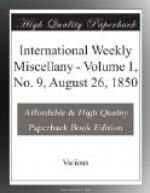The Prelude, as the title-page indicates, is a poetical autobiography, commencing with the earliest reminiscences of the author, and continued to the time at which it was composed. We are told that it was begun in 1799 and completed, in 1805. It consists of fourteen books. Two are devoted to the infancy and school-time of the poet; four to the period of his University life; two to a brief residence in London immediately subsequent to his leaving Cambridge, and a retrospect of the progress his mind had then made; and three to a residence in France, chiefly in the Loire, but partly in Paris, during the stormy period of Louis the Sixteenth’s flight and capture, and the fierce contest between the Girondins and Robespierre. Five books are then occupied with an analysis of the internal struggle occasioned by the contradictory influences of rural and secluded nature in boyhood, and of society when the young man first mingles with the world. The surcease of the strife is recorded in the fourteenth book, entitled “Conclusion.”
The poem is addressed to Coleridge; and apart from its poetical merits, is interesting as at once a counterpart and a supplement to that author’s philosophical and beautiful criticism of the Lyrical Ballads in his Biographia Literaria. It completes the explanation, there given, of the peculiar constitution of Wordsworth’s mind, and of his poetical theory. It confirms and justifies our opinion that that theory was essentially partial and erroneous; but at the same time it establishes the fact that Wordsworth was a true and a great poet in despite of his theory.
The great defect of Wordsworth, in our judgment, was want of sympathy with and knowledge of men. From his birth till his entry at college, he lived in a region where he met with none whose minds might awaken his sympathies, and where life was altogether uneventful. On the other hand, that region abounded with the inert, striking, and most impressive objects of natural scenery. The elementary grandeur and beauty of external nature came thus to fill up his mind to the exclusion of human interests. To such a result his individual constitution powerfully contributed. The sensuous element was singularly deficient in his nature. He never seems to have passed through that erotic period out of which some poets have never emerged. A soaring, speculative imagination, and an impetuous, resistless self-will, were his distinguishing characteristics. From first to last he concentrated himself within himself; brooding over his own fancies and imaginations to the comparative disregard of the incidents and impressions which suggested them; and was little susceptible of ideas originating in other minds. We behold the result. He lives alone in a world of mountains, streams, and atmospheric phenomena, dealing with moral abstractions, and rarely encountered by even shadowy specters of beings outwardly resembling himself. There is measureless grandeur and power in his moral speculations. There is intense reality in his pictures of external nature. But though his human characters are presented with great skill of metaphysical analysis, they have rarely life or animation. He is always the prominent, often the exclusive, object of his own song.




